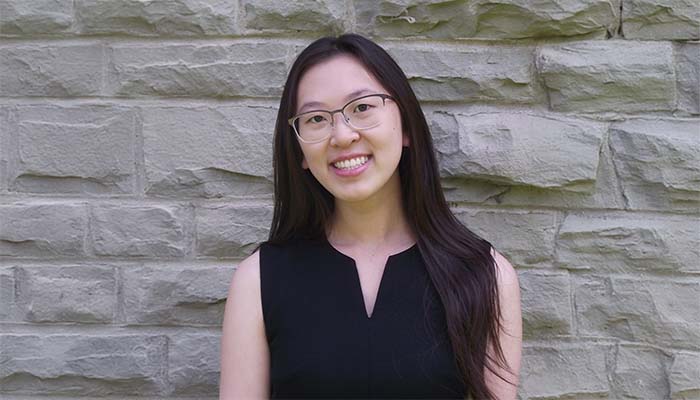Global Undergraduate Awards Spotlight: Christy Xie
The Global Undergraduate Awards recently announced the winning submissions for 2024, which include the following from Western: four Global Winners, four Regional Winners and 20 Highly Commended.

Christy Xie, BSc’24
(Honours Specialization in Integrated Science with Computer Science, with a Minor in Chemistry)
Global Winner: Chemical & Pharmaceutical Sciences
Paper title: Identification and Quantification of Multi-Component Street Drugs Using Deep Neural Networks
Please share a description of your research.
My research addresses the opioid and drug crisis in Canada by developing a machine learning model that uses Fourier-Transform Infrared (FTIR) spectroscopy to identify and quantify substances in street drugs. The study focuses on using convolutional neural networks to detect various compounds and their relative ratios within complex drug mixtures. By generating a map of FTIR spectra across a sample’s surface, the model accurately determines its composition, providing a powerful tool for harm reduction and policy decisions.
What led to your interest in this area?
For a long time, I have been interested in the application of technology to solve real-world problems. Being part of an integrated science program allowed me to explore the connections between various scientific disciplines and see how different fields can complement and enhance each other. After being introduced to analytical chemistry in my coursework and having the opportunity to work in a chemistry lab over the summer, I developed a keen interest in the practical applications of chemistry. This experience naturally led me to pursue a project that could blend computer science and chemistry—ultimately focusing on using machine learning to address the challenges in drug detection.
What prompted you to submit your paper to the competition?
I saw the Global Undergraduate Awards as a chance to share my work on a broader platform and connect with a community of like-minded individuals dedicated to innovation and problem-solving. The competition stood out as an opportunity to highlight the potential of using interdisciplinary approaches, like combining machine learning and chemistry, to tackle significant societal issues. I was excited to see how my research might contribute to the conversation around drug identification and harm reduction.
Can you describe how you felt/what you thought when you found out you’d been selected as a winner?
When my phone buzzed, I saw the caller ID was a foreign number that we had been told to look out for. I immediately knew it was from the Global Undergraduate Awards. I wanted to scream and do a celebratory dance, but since I was sitting in my Civil Procedure class, I had to sit quietly and pretend nothing had happened. Inside, though, I was absolutely thrilled and honoured—it was such an exciting and surreal moment. It felt incredibly validating to have my work acknowledged on an international level, and it reinforced my belief in the importance of interdisciplinary research. I was excited not just for myself but for everyone involved in the project and the broader implications it might have for addressing critical issues like drug identification and harm reduction.
What are your plans for the future – do you plan to continue in this field?
While I’m currently pursuing a law degree (JD) at the University of Pennsylvania Carey Law School, my background in chemistry and computer science plays a crucial role in shaping my career path. I plan to build on the skills I’ve gained and extend them to the legal field, particularly in areas where technology, science, and law intersect. I see my future as a bridge between these disciplines, leveraging my research experience to navigate complex legal issues in science and technology, and contribute to solutions that address real-world challenges like public health and innovation.
Will you be attending the Global Summit in Dublin? If so, what are you most looking forward to there?
Yes, I will be attending the summit in Dublin, and I'm looking forward to meeting other participants from diverse fields. I'm eager to share ideas and discuss different approaches to research and problem-solving, as well as learn about cutting-edge developments from other disciplines. It's a fantastic opportunity to engage in cross-disciplinary conversations and build connections. I’m also excited to be attending the summit with one of my best friends I’ve made while studying at Western.
What do you think the benefit of programs like the Undergraduate Awards is for students?
Programs like the Undergraduate Awards provide students with a platform to share their research on a global scale and receive recognition for their hard work. They also foster a sense of community among young researchers, encouraging interdisciplinary dialogue and collaboration. Moreover, the opportunity to attend summits and network with peers and professionals helps students broaden their perspectives and opens doors to new opportunities in their fields.
Is there anything else you’d like to share with us?
I’d like to express my gratitude to my supervisor, Dr. François Lagugné-Labarthet, and his research group for fostering such a great and supportive community. Their guidance and encouragement were instrumental to the success of this project. I also want to thank the Department of Chemistry for providing the resources and environment that allowed me to explore my research interests. Winning this award wouldn’t have been possible without their support, and I'm excited to continue exploring the connections between science, technology, and law in my future endeavors.

